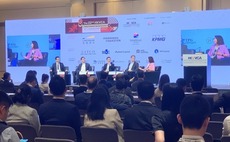
Asia GP-led secondaries hit record high in 2018
An increase in GP-led transactions propelled Asia secondary market volume to $7.8 billion last year, and more of the same is expected in 2019 – once managers have adjusted their mark-to-market valuations following fourth-quarter volatility in the public equities space.
A $1 billion stapled secondary involving two existing Asia funds managed by TPG Capital was the stand-out investment as GP-led deals worth a combined $4.8 billion were completed. This compares to $2.7 billion in 2017. There was a similar jump in activity at the global level, with financial sponsor secondaries reaching $22 billion, up from $16 billion in 2017 and $7 billion in 2016, according to Lazard's financial sponsor secondary market year-end review.
"We are seeing very strong deal flow because GP awareness and acceptance of this as a credible alternative liquidity option has been heightened by what was done last year and in 2017 in Asia Pacific," said Nick Miles, head of the private fund advisory group for Lazard in Asia. "But in the first quarter of this year, we have also seen discipline and some demand-side hesitation from buyers and global investment committees who are grappling with macro dislocation, fourth-quarter public market volatility, and geopolitical events."
The expectation is that deals coming to market will increase in the second quarter as uncertainty around valuations and business performance eases and underlying bid-ask spreads narrow.
Other notable Asia transactions from 2018 include Capital Today China Group rolling a pharmacy chain investment into a new single-asset vehicle in order to extend the holding period and Loyal Valley Capital completing a renminbi-to-US dollar restructuring. L Catterton Asia, Southern Capital Group, C-Bridge Capital, Basil Partners, and Telstra Ventures also tapped the secondary market in different ways, while the long-awaited spin-out of Standard Chartered's private equity team was announced in January.
Several blue-chip US venture capital managers pursued GP-led transactions last year, and Miles expects Asia to follow suit. The amount of capital committed to VC deals in the US increased threefold between 2007 and 2015 as start-ups stay under private ownership for longer, causing the number of listed companies to drop by more than half since 1997. GPs need liquidity solutions to address the imbalance between capital deployed and capital returned. Their Asian counterparts are in much the same position.
"The longer holding periods for private assets and the overhang of unrealized positions, in part due to challenging IPO conditions, are both factors that persist here as well," said Miles. "We think we will see China and India venture coming to the fore from quality managers because LPs have a lot of unrealized net asset value at high paper valuations. It may make sense to crystallize or partially reduce exposure to these positions, especially via secondary liquidity solutions that can take place offshore in US dollars."
These transactions are likely to take the form of strip sales – where minority stakes in a selection of investments are placed into a new vehicle backed by new investors but operated by the same manager – recapitalizations of clusters of assets through full spin-outs, and tail-end restructurings of entire funds. Strip sales are often seen as an attractive option because pricing tends to be favorable to the buyer and some upside is left on the table for existing investors to enjoy.
In 2017, Warburg Pincus sold a $1.2 billion strip from its 11th global fund comprising a minority interest in every Asian investment – including a fair number of technology-related assets – in the vehicle. The deal was led by Lexington Partners and Goldman Sachs. Lexington also led the TPG staple transaction.
It helps that there is a large amount of dry powder in the secondary market looking for deals, but Asia also presents several challenges. First, relatively few investors have the resources and experience in the region to be comfortable leading transactions, so it's easy for processes to lose momentum. Second, Asia is opaque. Especially with VC assets, investors exercise extreme caution, resulting in some transactions never getting traction because the bid-ask spread is so high.
"Perceived GP quality has always been important in Asia, but it will be increasingly important going forward if the macro environment worsens," Miles said. "Pricing and valuing assets in Asia Pacific - particularly early-stage minority investments - in emerging economies in the region can present challenges. Getting information is also more difficult, and exits can be more uncertain, especially if they are reliant on capital markets."
Latest News
Asian GPs slow implementation of ESG policies - survey
Asia-based private equity firms are assigning more dedicated resources to environment, social, and governance (ESG) programmes, but policy changes have slowed in the past 12 months, in part due to concerns raised internally and by LPs, according to a...
Singapore fintech start-up LXA gets $10m seed round
New Enterprise Associates (NEA) has led a USD 10m seed round for Singapore’s LXA, a financial technology start-up launched by a former Asia senior executive at The Blackstone Group.
India's InCred announces $60m round, claims unicorn status
Indian non-bank lender InCred Financial Services said it has received INR 5bn (USD 60m) at a valuation of at least USD 1bn from unnamed investors including “a global private equity fund.”
Insight leads $50m round for Australia's Roller
Insight Partners has led a USD 50m round for Australia’s Roller, a venue management software provider specializing in family fun parks.







